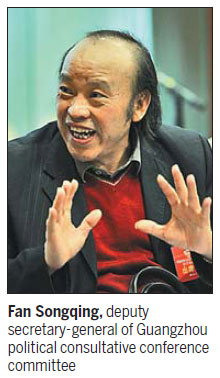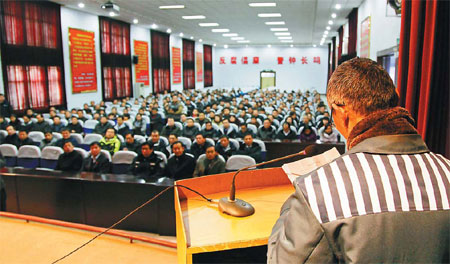Proposal to lift lid on assets
Updated: 2013-01-23 07:21
By Qiu Quanlin in Guangzhou, An Baijie in Beijing and Cang Wei in Nanjing (China Daily)
|
||||||||

|
A prisoner convicted of job-related crimes talks about his criminal experiences at a public meeting in a prison in Anyang, Henan province, on Monday. Li Gang / for China Daily |

Guangzhou officials start process of revealing personal holdings to public
Fan Songqing expected a heated debate over a proposal asking officials to report their assets after he became the first government and Party official in Guangzhou, capital of Guangdong province, to disclose his family's assets four days ago.
In a proposal to the annual session of the city's political consultative conference, which ended on Tuesday, he said that Guangzhou should be a pioneer in promoting the practice, asking that around 2,000 officials in the city report their family assets, including houses, land, cars and other assets worth over 5,000 yuan ($804).
After making the proposal, he told the Guangzhou-based Southern Metropolis Daily that his family has a 74 sq m home.
"I also sold another 50 sq m home in 2003. It was subsidized by the government," Fan said.
The 58-year-old official, who currently serves as deputy secretary-general of the city's political consultative conference committee, said he did not feel pressure from government officials on the issue.
"There was a heated debate over the proposal after I told the newspaper about my family's assets. But I've never felt pressure since I do not have other extra assets or illegal earnings," he told China Daily on Tuesday.
At a panel discussion, he also told members of the city's political consultative conference that his monthly salary was around 10,000 yuan.
"I have paid attention to corruption cases involving government and Party officials in recent years. Those who have more family assets and large illegal incomes are afraid of reporting them," Fan said.
After he revealed his assets, several local officials including Su Zhijia, chairman of Guangzhou political consultative conference committee, also expressed their willingness to publicize their families' assets.
"We should not wait for a city-wide implementation of the reporting system. If it had been put into operation earlier, there wouldn't be so many officials involved in corruption in the past few years," he said.
"As an official, I have fulfilled my responsibility by reporting my family's assets. I am going to retire soon and I will be happy when more officials follow the practice."
In his proposal, Fan also asked retired officials to be included in the reporting system.
"From the previous corruption cases, we can see that some officials have illegally earned a lot after retirement," Fan said.
"Their relatives' assets should also be publicized as some officials will transfer their illegal income to family members."
In response to Fan's proposal, Cao Jianliao, deputy mayor of Guangzhou, said he would follow suit.
"I would like to publicize my family's assets if the authorities require officials to do so," Cao said.
A group of officials from Guangzhou have been sent to Hong Kong and Macao to learn from their successful practices in disclosing officials' assets, according to Wang Xiaoling, head of the city's Party anti-graft body.
Some officials in the city's Nansha district are required to report family assets to the Party's supervision agencies after Spring Festival, which falls on Feb 10.
Wang said that not all of the district's officials are required to report their assets.
"We will learn from the practices in Hong Kong and Macao, where only around 40 percent of departments require their officials to report their assets," she added.
Under the current proposal, such information will be reported to the Party's anti-graft authorities rather than disclosed to the public, she said.
Shi Jishan, head of the Party's anti-graft body in Changchun, doubted officials could voluntarily report their assets in an honest manner.
"In the past, most officials who have been found guilty of corruption refused to admit their wrongdoing," he said. "So it would be impossible for all officials to voluntarily reveal their assets."
Nanjing's experience
The authorities in Jiangning district of Nanjing, Jiangsu province, put forward a policy requiring officials to declare personal assets as early as June 2011.
Officials in the district are required to report their savings, real estate, cars, and the business their spouses and children are engaged in before being promoted, according to the policy.
So far, a total of 198 officials from 59 workplaces in the district have completed their asset reports.
The anti-graft body will verify the declaration, and officials who conceal the assets will have their names listed before further punishment is made.
Long Xiang, head of Nanjing's anti-graft body, said the pilot program had some influence on newly promoted officials, but the asset declaration system still has some problems, including difficulties in verification and the coverage of higher-level officials.
Contact writers at qiuquanlin@chinadaily.com.cn, anbaijie@chinadaily.com.cn and cangwei@chinadaily.com.cn
(China Daily 01/23/2013 page3)

 In Photos: 7.0-magnitude quake hits Sichuan
In Photos: 7.0-magnitude quake hits Sichuan
 Li Na on Time cover, makes influential 100 list
Li Na on Time cover, makes influential 100 list
 FBI releases photos of 2 Boston bombings suspects
FBI releases photos of 2 Boston bombings suspects
 World's wackiest hairstyles
World's wackiest hairstyles
 Sandstorms strike Northwest China
Sandstorms strike Northwest China
 Never-seen photos of Madonna on display
Never-seen photos of Madonna on display
 H7N9 outbreak linked to waterfowl migration
H7N9 outbreak linked to waterfowl migration
 Dozens feared dead in Texas plant blast
Dozens feared dead in Texas plant blast
Most Viewed
Editor's Picks

|

|

|

|

|

|
Today's Top News
Live report: 7.0-magnitude quake hits Sichuan, heavy casualties feared
Boston suspect cornered on boat
Cross-talk artist helps to spread the word
'Green' awareness levels drop in Beijing
Palace Museum spruces up
First couple on Time's list of most influential
H7N9 flu transmission studied
Trading channels 'need to broaden'
US Weekly

|

|








